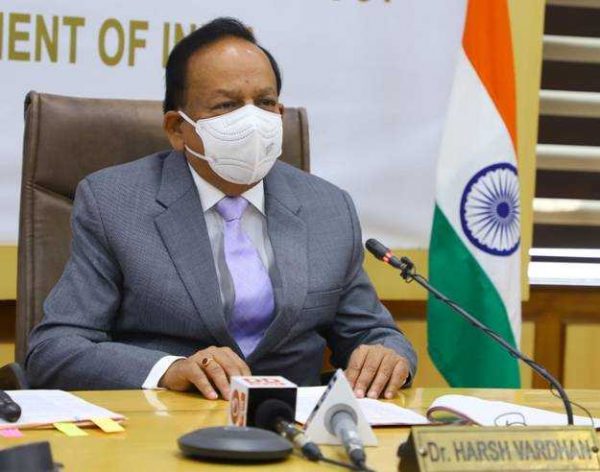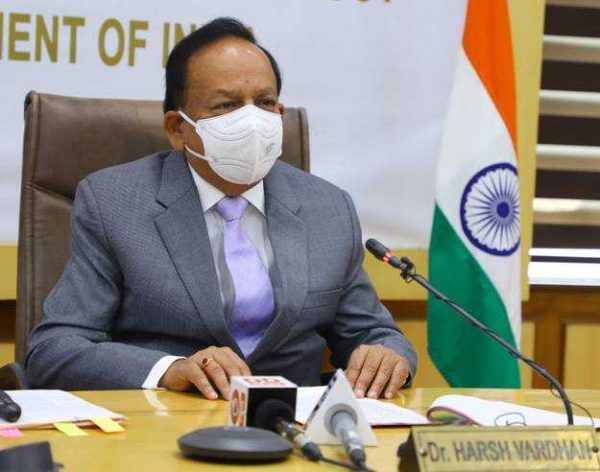Union Minister of Science & Technology, Earth Sciences and Health & Family Welfare, Dr Harsh Vardhan today said, “It’s not just the science that has been remarkable this year, but the entire spirit of international collaborations too…. And the science diplomacy that went hand in hand with this”. He was addressing the “Science Diplomacy” event of the 6th edition of the India International Science Festival-2020 (IISF-2020) which has been organized on a virtual platform. He said, “The year 2020 has been the Year of Science when the best of humanity has shone through the gloom that descended upon us due to the COVID19 pandemic. As the spread of the disease accelerated, so did the research efforts. Major global collaborations were set up so that scientists could share their expertise, and plans were implemented to speed up clinical trials so that treatments, vaccines, and diagnostics could be tested as quickly as possible, without compromising the safety of the participants”.

Dr. Harsh Vardhan highlighted, “The ‘Science Diplomacy’ event is being introduced for the first time as a part of IISF for sensitizing all stakeholders about the crucial role of science diplomacy in statecraft and the use of science and technology to advance national interests”. He said, “Today, as a result of the pandemic, scientific collaborations have become the order of the day, shared science has given us shared gains, and this could not have been possible without science diplomacy by both developed as well as developing nations”.
Stating that in the 21st century, the role of science, technology, and innovation has become a fundamental tool to balance social, economic, technological, and financial resources of any nation, the Minister drew attention that there are many international issues like climate change, extreme weather, deforestation, population, health, and pandemic that need the attention and thrust of multi-stakeholders at the local as well as the global level.
He said, “Science diplomacy is not new to India. Science diplomacy has been a part of our foreign policy since decades. India enjoys international cooperation with more than 50 countries in different areas of science and technology“. “India has committed to sharing its experience in the field of Science, Technology, and Innovation with neighbouring countries like Bangladesh, Bhutan, Nepal, Maldives, etc. through existing capacity building programs and transferring its affordable technologies to address the socio-economic needs of its neighbours. African countries have received and welcomed the India-Africa science and technology activities with much enthusiasm”, he added.
Dr. Harsh Vardhan said, “During the current pandemic, India has already supplied anti-malarial drug hydroxychloroquine and paracetamol to more than 60 countries”. “India has continued a sustained and regular engagement with other countries for the development and manufacturing of the vaccine and is optimistic that it shall play a vital role in making vaccines accessible and affordable to the whole world”, he highlighted. “Currently in India, 30 different groups from academia and industry are actively involved in co-development and trials for COVID-19 vaccine”, he added.
The Minister pointed out “Our significant scientific might is well acknowledged across the world and under the Partnerships for Accelerating Clinical Trials, called PACT, capacity building activities for facilitating phase III clinical trials of Indian COVID vaccines in partnering nations are being supported”.
Dr. Harsh Vardhan said, “Despite the global crisis thrown up by the pandemic, India has made some bold and transformational policy changes. Among other sweeping changes, we are also working round the clock to announce a brand new Science, Technology, and Innovation Policy, 2020, called the STIP 2020”. “The Science Ministry has put up a commendable effort to gather and process inputs from as many as 15,000 stakeholders from around the country and abroad as part of the STIP formulation. The new policy seeks to encourage local to global innovation, need-based technology development, and sustainable growth”, he pointed out.
The Minister said, “The three days of the IISF festival offer a good opportunity for those participating in different sessions of the ‘Science Diplomacy’ event to understand the role of science and technology at the global platform”.
Congratulating the organizers of the Science Diplomacy Conclave, Dr. Harsh Vardhan said, “IISF has become an integral part of India’s long-term vision in developing and widening the spectrum of scientific temper among young students, researchers, scientists, and technocrats for a healthy exchange of knowledge and ideas to encourage innovation and creative thinking for the betterment of our society”.
Dr Sanjeev K Varshney, Head, International Cooperation Division, DST, Dr. Jyoti Sharma, Scientist E, International Cooperation Division, DST, eminent speakers, panelists from India and abroad participated in the deliberations.

